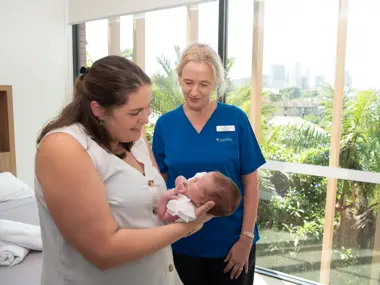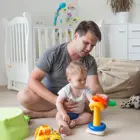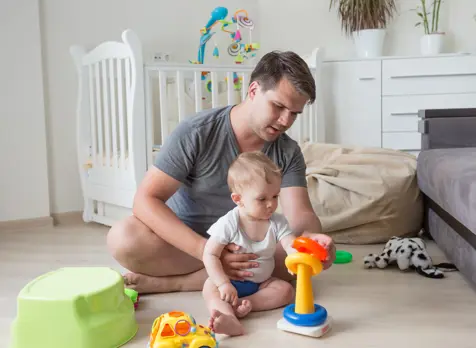Play
3 to 8 Months

Play is one of the ways babies learn about their bodies and their world. Many of the interactions you have with your baby are subtle forms of play.
How can I play with my baby?
From an early age, babies respond actively to their parents by watching your face, listening to your voice, smiling and making sounds.
At this age your baby’s play is centred on what you do together. Even everyday activities like nappy changes, mealtimes and bath times can be considered play as you're interacting and communicating with your baby. You can make every activity a form of play by singing familiar songs and rhymes, talking to your baby and touching them.
As your baby grows, they will discover objects to shake, suck, bang or roll. Your baby will enjoy learning to coordinate eyes and hands and feet, and bring anything and everything to their mouth using their hands.
Activities for a 3 month old baby
Tummy Time: Start with short sessions of tummy time (a few minutes each day) to help your baby strengthen their neck and upper body muscles. Some babies don’t like to be on their tummy and will protest. It helps to reassure your baby if you get down to floor level with them.
High-Contrast Toys: Babies at this age are attracted to high-contrast patterns and colours. Use black and white toys or images to capture their attention. They particularly like objects that have faces on them or checks and stripes.
Interactive Playmat: Use a playmat with hanging toys that your baby can reach for and grab at. Once they're rolling, they might also enjoy trying to get closer to the toys they like.
Activities for a 4 month old baby
Mirror Play: Place a baby-safe mirror in front of your baby during supervised playtime or lay them on their tummy on the floor in front of a mirrored wardrobe. They'll be fascinated by their own reflection.
Music: Babies love music and it's easy to add music to your day. You could sing nursery rhymes and do the actions. You could put some of your favourite songs on and hold your baby while you dance to the rhythm of the music. Playing music and making music with your baby, is a very positive and enjoyable activity and key to supporting baby’s development. As your baby grows, they will enjoy making music by banging on a saucepan with a wooden spoon or banging on a toy drum.
Rattles: Give your baby a lightweight, easy-to-grasp rattle to explore. This will help them practice their grip and hand-eye coordination. They also might enjoy soft, textured toys to touch and explore with their hands and mouths.
Activities for a 5 to 6 month old baby
Reading books: It's never too early to start reading to your baby. You could read books with simple pictures and textures. Point to pictures and name them as you go. Lift the flap books are another favourite for babies. eBook readers are fine to use occasionally but a balance is needed as your baby may miss developing the fine motor skills that are required to turn pages of a hard covered book.
Exploring different textures: Introduce various textures to your baby like soft blankets, crinkly materials, and fuzzy toys for tactile exploration. Make sure anything they play with is safe for them to put in their mouth as often that's a way they explore at this age.
Peekaboo: Babies love playing peekaboo, no matter their age. Start by using your hands or a soft cloth to cover your face, then removing it and softly saying 'peekaboo'! It will help develop your baby's sense of object permanence. Object permanence is the understanding that things still exist even when you can't see or touch them.
Cause and effect toys: Any toy where they have to press a button, move something or see something light up are a winner at this age. It helps them learn about problem solving, fine motor skills and gives them instant gratification.
Activities for a 7 to 8 month old baby
Blocks or stacking cups: Having a set of blocks or stacking cups are great fun for this age. They can learn how to grab and stack into piles. They're fun to knock down too! You can also use this time to practise sitting with lots of pillows supporting them.
Outdoor Time: If possible, spend time outdoors so your baby can explore nature and different outdoor textures, sights and smells.
Water play: Babies love bathtime but you don't have to wait until the evening to do some water play. Fill a shallow tub with water and provide safe water toys for splashing and scooping. Of course, it's vital that you provide constant supervision during this activity.
Imitation: Encourage your baby to imitate simple actions like clapping hands, waving, and peekaboo.
Top tips about 3 to 8 month baby play
-
1
You’re the best play object your baby can have.
-
2
Very young babies enjoy looking at toys and objects with contrasting colours – red, black and white. They particularly like objects that have faces on them or checks and strips.
-
3
Supervise closely at all times, especially around water and climbing equipment.
-
4
Ask your local council or library about whether they have a toy library. Similar to a book library, you can borrow age appropriate toys for a few weeks at a time.











































